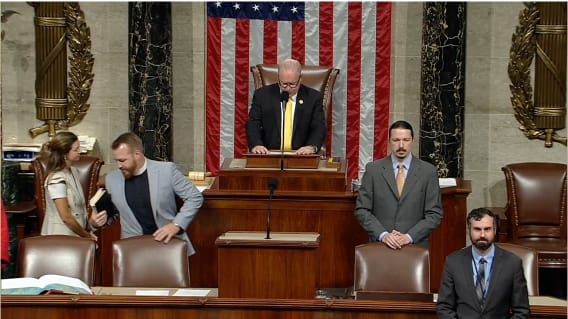The 118th Congress's Unfinished Business: Civil Liberties Protections
The institutional threats to our constitutional rights left unaddressed by the federal legislature are major, long standing, and perfectly exploitable by a would-be authoritarian like Trump.

The institutional threats to our constitutional rights left unaddressed by the federal legislature are major, long standing, and perfectly exploitable by a would-be authoritarian like Trump.
As I write this piece, rumors are rife inside the Beltway that Congress will exit Washington early for the campaign trail, with September 20 the new fly-out day. If that is indeed what happens, the only legislation I'd expect the House and Senate to move before fleeing town is a continuing resolution to keep the government open, probably through mid-November.
What will not happen, absent some kind of miracle, is any Congressional action on three key institutional threats to our constitutional rights that could be weaponized by Trump should he prevail against Harris in the looming presidential election.
The Secrecy System: As I noted in Antiwar.com last week, one of the rare bipartisan bright spots this session has been the partnership between Senators Gary Peters (D-MI) and John Cornyn (R-TX) to try to rein in out-of-control government secrecy. Their Classification Reform for Transparency Act of 2024 (S. 4648) would, if enacted, be the first time that a federal statute would explicitly prohibit the misuse of the classification system by Executive branch officials to conceal waste, fraud, abuse, mismanagement, or even criminal conduct.
The flaw in their proposal is that it would leave the power to determine the punishment for violations of the law in the hands of Executive branch officials--an approach that would make it too easy for violators to get off with an administrative hand slap instead of facing a jury over a felony charge as they should. Even so, had the bill been moved through the legislative process this year, it could've been strengthened to criminalize misclassification actions, a badly needed deterrent to conducting unlawful surveillance (or worse) under a shroud of secrecy.
FISA Reform: And speaking of atrocious government conduct taking place in secret, the FISA Section 702 reauthorization measure that became law in late April has expanded the ability of the NSA and FBI to legally shake down even more businesses involved in the telecommunications sector, a development that was denounced even by some former Justice Department FISA veterans. And even though Senate Intelligence Committee Chairman Mark Warner pledged in the aftermath of the reauthorization vote to fix the offending surveillance expansion via the annual Intelligence Authorization Act (IAA), some of his Senate colleagues worked to undermine his efforts, thus far successfully, it appears.
While House and Senate Intelligence Committee members and staff will always claim that passage of the IAA is "must do," there have been times in the past where it simply hasn't happened. House Intelligence Committee Chairman Mike Turner (R-OH) championed the FISA Section 702 expansion, and he has no incentive whatsoever to cave to Warner's demands.
The likely shortened Congressional calendar in September and the uncertainty over what legislation, if any, will be fast tracked for action in a lame duck session make it highly unlikely that we'll see a FISA fix this year. That's especially terrifying given Trump's repeated pledges to go after his political opponents if he's elected again...and the radically expanded nature of the FISA Section 702 program could be a boon for him and his minions in that regard.
Flying The Unfriendly Skies: TSA's Facial Recognition Crusade: It's been nearly 18 months since TSA Director David Pekoske told SXSW attendees that TSA's quest to make facial recognition technology (FRT) the means of passenger identification was intended to reduce "friction" in the airline travel process. Getting people to trade their privacy rights for the government's convenience is a standard ploy by officials like Pekoske.
The reality is that FRT is a potential government biometric cornerstone for population control and monitoring, to the extent that FRT actually works properly and without bias leading to false positive (or false negative) results. As it stands, the examples of FRT bias failures are numerous and alarming. And for several people--mostly Black Americans--erroneous FRT results have been calamitous, professionally and personally. I shudder to think about how a Trump-controlled TSA might use FRT technology to track and target his political opponents.
Senator Jeff Merkley (D-OR) has had more than enough of TSA's FRT nonsense, and his experiences with FRT and TSA have been revealing, to say the least. And while Merkley is doing all he can to remind the air traveling public that they can opt out of TSA's FRT insanity, he wants to go further and get TSA out of the business of using FRT at all absent Congressional authorization.
His "Traveler Privacy Protection Act" (S. 3361) would, assuming Congress actually granted TSA FRT use authority, require any FRT imagery to be deleted after 90 days. The bill has attracted an interesting bipartisan group of supporters.
While I'd prefer to see Merkley take on the larger issue of why TSA shouldn't be in the traveler ID business at all unless you're on the "most wanted" list, his bill is a big step in the right direction, though for the reasons cited above action on it the balance of this Congress is highly unlikely.
Even so, if your senator is not a current co-sponsor of the bill, please call them or drop them a line asking them to become one. The more support Merkley accumulates, the more likely it is his bill can get a hearing and maybe even a vote in 2025.
Thanks for reading the Sentinel. If you're not currently a subscriber, please consider becoming one as doing so is free through 2024 and it's an easy way to show your support for my work. Also, please share this piece with family, friends, and anyone else you believe would benefit from reading it.





